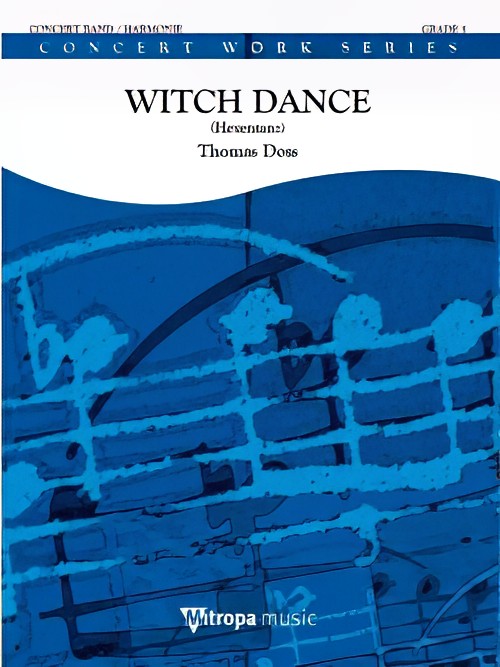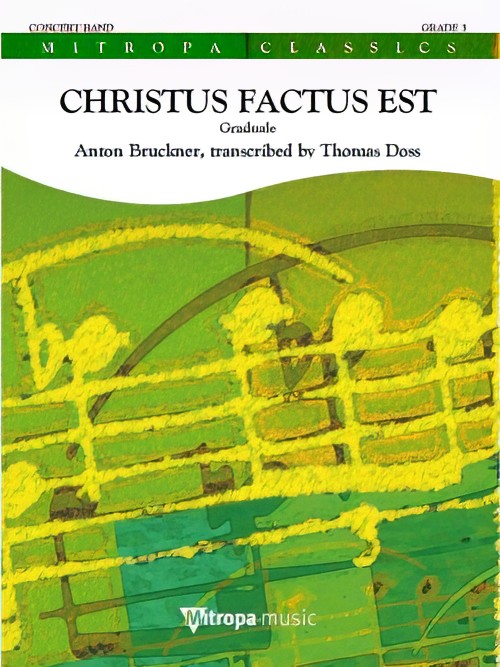Results
-
 £109.99
£109.99Il Briccone - Thomas Doss
A wind music federation from Upper Austria commissioned Thomas Doss to compose Il Briccone, the Italian word for scoundrel. It is an elegant concert march which combines light ironic elements with virtuosity and exciting rhythms. Its alternation between chamber music-like passages with figures from solo instruments combined with surprising stylistic changes keeps everybody's interest. This march is sure to be a great crowd pleaser.
Estimated dispatch 7-14 working days
-
 £179.99
£179.99Austrian Overture - Thomas Doss
Austria is an industrious country. During the last century--which was characterized by extreme changes--the hard-working and ambitious people achieved a great deal, enduring two world wars and numerous political skirmishes. Despite all the problems involved in a change from a dual monarchy to a small state, Austria has found its independence. With his Austrian Overture, Thomas Doss looks toward the future. The first part of the composition provides an optimistic outlook; along with the happiness and energy, some musical humor is also present: while the horns powerfully express joy, small yodeling melodies sound throughout. As the rhythm continues insearch of new ways to go, catchy tunes compete to be heard. However, in addition to the energetic, diligent Austria, there's also the quiet landscape where one can enjoy repose and beauty. These aspects - as well as the freedom of spirit and cultural life -are conveyed in the second part of the work through the surprising linking of chords, romantic phrasing, and tender melodies. But life never stands still: creativity, ambition, and work are the driving forces of our existence. Embracing this thought, a reprise of the first part provides a compelling ending.
Estimated dispatch 7-14 working days
-
 £194.99
£194.99Aurora - Thomas Doss
Aurora was the Greek goddess of dawn. Through the ages dawn has had a significant spiritual meaning - daylight conquering the ominous darkness of the night. This exciting work by Thomas Doss uses musical imagery to reflect the meaning of dawn by cultures throughout the world. The emphasis lies on oriental sounds - symbolizing the daily aurora in the Far East.
Estimated dispatch 7-14 working days
-
 £154.99
£154.99Ouverture Allemande - Thomas Doss
This festive overture by the Austrian composer Thomas Doss, whose father was German, is intended to be a symbol of the friendship between Germany and Austria, and the countries that border on these two states. In times of union and cooperation, the European thinking should be one of tolerance and openness when it comes to national identities and cultures. European culture has many faces - that is what makes it unique. The shadows of the past, however, should never be forgotten, but they must not obscure the present and the future. Many ghosts wander through this overture, and those who listen carefully will also hear a great master of classical music ghost around. Acreative new opening work for any concert.
Estimated dispatch 7-14 working days
-
 £154.99
£154.99The Monk and the Mills - Thomas Doss
Evil people know no songs! Inspiration for this work was taken from the legend of the "Valley of the Mills", in which a traveller taught songs to the people of a village who had been put under a spell by a monk for their violation of moral standards. He brought song and prosperity back to the valley. It is this enchanting story, which shows the positive power of music, that Thomas Doss used as the basis for this splendid concert work which will be loved by all who perform it and listen to it.
Estimated dispatch 7-14 working days
-
 £179.99
£179.99The Colors of Tali - Thomas Doss
Tali is a thirteen-year-old Israeli girl who has grown up amidst the religious conflicts between Palestinians, Christians, and Jews. Thomas Doss was so touched by a poem she wrote, he decided to set it to music. The poem and the music describe the world from a child's perspective, a child that has grown up with war and tries to express things she cannot yet fully understand.
Estimated dispatch 7-14 working days
-
 £139.99
£139.99Firework - Thomas Doss
Firework is a composition commissioned by Musikkapellen Energie-AG and Magistratskapelle Stadt Linz.This sparkling work shows that from time to time Thomas Doss is happy to produce music of sheer entertainment.Fireworks are always joyful and festive. Whether big or small, we all love watching fireworks. In this piece of music, the audience experiences not so much a visual feast as a spectacle in sound--a star-burst of colourful melody and rhythm that guarantees high spirits and a good mood.
Estimated dispatch 7-14 working days
-
 £102.99
£102.99Minimundus - Thomas Doss
Thomas Doss composed this suite against the backdrop of his experience with young conductors and youth orchestras. Each of the four parts contains a different "soundscape", in which each of us is free to let our imaginations run wild.An Overture, heralding a celebration, a magnificent Pastorale at dusk, the Lament that seems descended from heaven, and finally a colourful, fiery Danza - ideal for young orchestras and conductors with plenty ofimagination.
Estimated dispatch 7-14 working days
-
 £141.99
£141.99Witch Dance (Hexentanz) (Concert Band - Score and Parts) - Doss, Thomas
Witch Dance is a work commissioned by the Stadtkapelle Rottenburg on the occasion of its 150th anniversary. Thomas Doss based the musical material on melodies from the Rottenburger Narrenmarsch and incorporated the text of the Witch Kitchen scene from Goethe's Faust. The composition, which initially describes an idyllic townscape a few days before the annual carnival, culminates in a terrifying haunting. Reality, customs and fantasy combine to form a dangerous mixture.Duration: 9.45
Estimated dispatch 7-14 working days
-
 £67.50
£67.50Christus Factus Est (Concert Band - Score and Parts) - Bruckner, Anton - Doss, Thomas
Thomas Doss orchestrated this inspiring and very playable transcription of Christus factus est (WAB 11), the motet written by Bruckner in 1884, for wind orchestra. After Messe fr den Grundonnerstag from 1844 and a motet for eight-voice mixed choir, three trombones and string instruments ad libitum from 1873, this was Bruckner's third setting of the Latin gradual (Gregorian chant) of the same name. Wagner's influence can be clearly heard.Duration: 5.15
Estimated dispatch 7-14 working days
